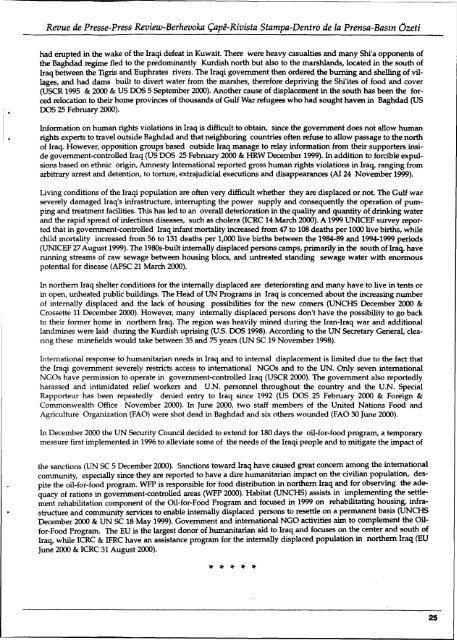Bulletin de liaison et d'information - Institut kurde de Paris
Bulletin de liaison et d'information - Institut kurde de Paris
Bulletin de liaison et d'information - Institut kurde de Paris
Create successful ePaper yourself
Turn your PDF publications into a flip-book with our unique Google optimized e-Paper software.
Revue <strong>de</strong> Presse-Press Review-Berhevoka Çapê-Rivista Stampa-Dentro <strong>de</strong> la Prensa-Baszn Oz<strong>et</strong>i<br />
had erupted in the wake of the Iraqi <strong>de</strong>feat in Kuwait. There were heavy casualties and many Shi'a opponents of<br />
the Baghdad regime fled to the predominantly Kurdish north but also to the marshlands, located in the south of<br />
Iraq b<strong>et</strong>ween the TIgris and Euphrates rivers. The Iraqi government then or<strong>de</strong>red the burning and shelling of villages,<br />
and had dams built to divert water from the marshes, therefore <strong>de</strong>priving the Shi'ites of food and cover<br />
(USCR 1995 & 2000 & US DOS 5 September 2(00). Another cause of displacement in the south has been the forced<br />
relocation to their home provinces of thousands of Gulf War refugees who had sought haven in Baghdad (US<br />
DOS 25 February 2(00).<br />
Information on human rights violations in Iraq is difficult to obtain, since the government does not allow human<br />
rights experts to travel outsi<strong>de</strong> Baghdad and that neighboring countries often refuse to allow passage to the north<br />
of Iraq. However, opposition groups based outsi<strong>de</strong> Iraq manage to relay information from their supporters insi<strong>de</strong><br />
government-controlled Iraq (US DOS 25 February 2000 & HRW December 1999).In addition to forcible expulsions<br />
based on <strong>et</strong>hnic origin, Amnesty International reported gross human rights violations in Iraq, ranging from<br />
arbitrary arrest and <strong>de</strong>tention, to torture, extrajudicial executions and disappearances (AI 24 November 1999).<br />
Living conditions of the Iraqi population are often very difficult wh<strong>et</strong>her they are displaced or not. The Gulf war<br />
severely damaged Iraq's infrastructure, interrupting the power supply and consequently the operation of pumping<br />
and treatment facilities. This has led to an overall <strong>de</strong>terioration in the quality and quantity of drinking water<br />
and the rapid spread of infectious diseases, such as cholera (ICRC 14 March 2(00). A 1999 UNICEF survey reported<br />
that in government-controlled Iraq infant mortality increased from 47 to 108 <strong>de</strong>aths per 1000 live births, while<br />
child mortality increased from 56 to 131 <strong>de</strong>aths per 1,000 live births b<strong>et</strong>ween the 1984-89 and 1994-1999 periods<br />
(UNICEF 27 August 1999). The 1980s-built internally displaced persons camps, primarily in the south of Iraq, have<br />
running streams of raw sewage b<strong>et</strong>ween housing blocs, and untreated standing sewage water with enormous<br />
potential for disease (AFSC 21 March 2000).<br />
In northern Iraq shelter conditions for the internally displaced are <strong>de</strong>teriorating and many have to live in tents or<br />
in open, unheated public buildings. The Head of UN Programs in Iraq is concerned about the increasing number<br />
of internally displaced and the lack of housing possibilities for the new comers (UNCHS December 2000 &<br />
Cross<strong>et</strong>te 11 December 2000). However, many internally displaced persons don't have the possibility to go back<br />
to their former home in northern Iraq. The region was heavily mined during the Iran-Iraq war and additional<br />
landmines were laid during the Kurdish uprising (U.S. DOS 1998). According to the UN Secr<strong>et</strong>ary General, clearing<br />
these minefields would take b<strong>et</strong>ween 35 and 75 years (UN SC 19 November 1998).<br />
International response to humanitarian needs in Iraq and to internal displacement is limited due to the fact that<br />
the Iraqi government severely restricts access to international NGOs and to the UN. Only seven international<br />
NGOs have permission to operate in government-controlled Iraq (USCR 2000). The government also reportedly<br />
harassed and intimidated relief workers and U.N. personnel throughout the country and the U.N. Special<br />
Rapporteur has been repeatedly <strong>de</strong>nied entry to Iraq since 1992 (US DOS 25 February 2000 & Foreign &<br />
Commonwealth Office November 2000). In June 2000, two staff members of the United Nations Food and<br />
Agriculture Organization (FAO) were shot <strong>de</strong>ad in Baghdad and six others woun<strong>de</strong>d (FAO 30 June 2(00).<br />
In December 2000 the UN Security Council <strong>de</strong>ci<strong>de</strong>d to extend for 180 days the oil-for-food program, a temporary<br />
measure first implemented in 1996 to alleviate some of the needs of the Iraqi people and to mitigate the impact of<br />
the sanctions (UN SC 5 December 2000). Sanctions toward Iraq have caused great concern among the international<br />
community, especially since they are reported to have a dire humanitarian impact on the civilian population, <strong>de</strong>spite<br />
the oil-for-food program. WFP is responsible for food distribution in northern Iraq and for observing the a<strong>de</strong>quacy<br />
of rations in government-controlled areas (WFP 2000). Habitat (UNCHS) assists in implementing the s<strong>et</strong>tlement<br />
rehabilitation component of the Oil-for-Food Program and focused in 1999 on rehabilitating housing, infrastructure<br />
and community services to enable internally displaced persons to res<strong>et</strong>tle on a permanent basis (UNCHS<br />
December 2000 & UN SC 18 May 1999). Government and international NGO activities aim to complement the Oilfor-Food<br />
Program. The EU is the largest donor of humanitarian aid to Iraq and focuses on the center and south of<br />
Iraq, while ICRC & IFRC have an assistance program for the internally displaced population in northern Iraq (EU<br />
June 2000 & ICRC 31 August 2000).<br />
* * * * *<br />
25

















